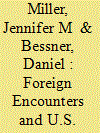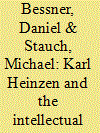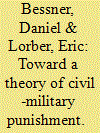| Srl | Item |
| 1 |
ID:
179052


|
|
|
|
|
| Summary/Abstract |
On December 20, 1940, U.S. President Franklin Delano Roosevelt delivered his sixteenth fireside chat. With Europe reeling from Nazi Germany’s successful conquest of France, the signing of the Tripartite Pact, and the recently concluded Battle of Britain, Roosevelt implored Americans to build “the great arsenal of democracy” that would aid the United Kingdom in its struggle against Germany.
|
|
|
|
|
|
|
|
|
|
|
|
|
|
|
|
| 2 |
ID:
142113


|
|
|
|
|
| Summary/Abstract |
Neorealism is one of the most influential theories of international relations, and its first theorist, Kenneth Waltz, a giant of the discipline. But why did Waltz move from a rather traditional form of classical realist political theory in the 1950s to neorealism in the 1970s? A possible answer is that Waltz's Theory of International Politics was his attempt to reconceive classical realism in a liberal form. Classical realism paid a great deal of attention to decisionmaking and statesmanship, and concomitantly asserted a nostalgic, anti-liberal political ideology. Neorealism, by contrast, dismissed the issue of foreign policymaking and decisionmaking. This shift reflected Waltz's desire to reconcile his acceptance of classical realism's tenets with his political commitment to liberalism. To do so, Waltz incorporated cybernetics and systems theory into Theory of International Politics, which allowed him to develop a theory of international relations no longer burdened with the problem of decisionmaking.
|
|
|
|
|
|
|
|
|
|
|
|
|
|
|
|
| 3 |
ID:
095289


|
|
|
|
|
| Publication |
2010.
|
| Summary/Abstract |
Scholars have long recognized the importance of Karl Heinzen's Mord und Freiheit in the history of terrorist thought. Yet the translation most scholars have relied on-1881s Murder and Liberty-is incomplete. Our new translation reveals four elements omitted from the 1881 translation. First, Heinzen conceived of terrorism as a transnational phenomenon. Second, he provided a material justification for terrorist tactics. Third, Heinzen viewed terrorism as both a tool to impel human society to progress and as a "progressive" tool of violence. Finally, he argued in favor of the primary modern tactic of terrorism-the indiscriminate bombing of civilians.
|
|
|
|
|
|
|
|
|
|
|
|
|
|
|
|
| 4 |
ID:
115268


|
|
|
|
|
| Publication |
2012.
|
| Summary/Abstract |
This article addresses a significant question in American civil-military relations: under what conditions will civilian principals punish military leaders for shirking? In order to inductively derive a theory of civil-military punishment, the authors examine two cases of military shirking where there is little doubt that insubordination occurred. The first case the authors analyze is Douglas MacArthur's insubordination under Harry Truman during the Korean War, and the second is Colin Powell's scuttling of Bill Clinton's plan to allow homosexuals to serve openly in the military in late 1992 and early 1993. This analysis indicates that two factors are linked to civil-military punishment. First, the salience of the issue at stake determines whether he or she decides to punish shirking. The second factor linked to punishment is whether or not the civilian has the military's support to pursue punishment.
|
|
|
|
|
|
|
|
|
|
|
|
|
|
|
|